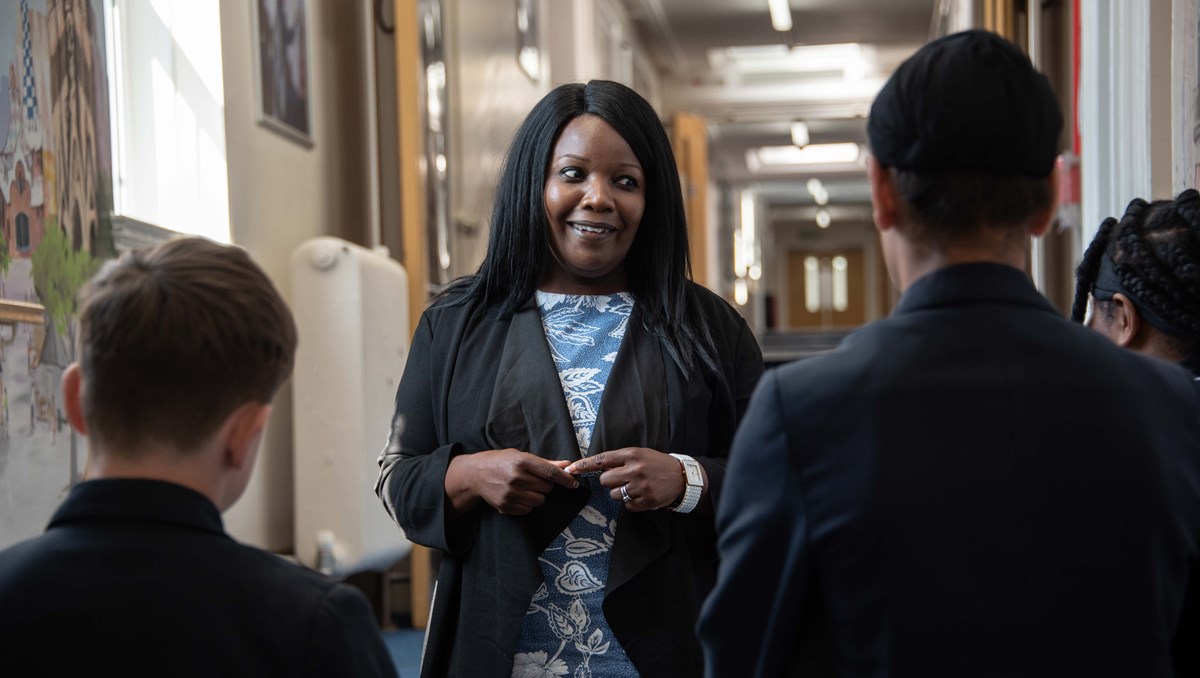Leaders with lives
Emma Kell talks to six schools leaders about how they balance the challenges of their roles with having a life. They shine a valuable and authentic light on the life of a school leader and offer advice to those who are finding it tough.
Articles / 11 mins read

During the pandemic, school leaders’ crucial role at the heart of their communities and the gaps in society became increasingly evident. Schools have instinctively stepped in to take on the challenges and fill the void where support for our most vulnerable has been lacking.
For many leaders, these extra responsibilities have evolved into an unmanageable, unending task and leadership feels lonelier – and more exhausting - than ever. It’s little surprise, then, that many are voting with their feet and stepping away from the role - with the majority of those in SLT who are not headteachers no longer aspiring to take on the role. (NAHT, Dec 2021)
And yet, we need strong leaders and ultimately, leading a school has to be compatible with being a whole human being. For this piece, I interviewed six school leaders who stepped up in response to my question: ‘Is it possible to be a school leader and have a life?’.
There is no hint of smuggery of these leaders’ stories. There are no superheroes here. Many have, like the rest of us, faced genuine struggles and suffering. Many have neglected their own needs or those of their loved ones and some have considered walking away from the role altogether. Their stories shine a valuable and authentic light on the life of a school leader and offer reassurance that you are not alone.
I spoke to four primary school headteachers, one secondary headteacher and one deputy head. Whilst this is inevitably a skewed sample, I believe that the richness and authenticity of their responses offer a valuable addition to the narrative around leaders and work-life balance.
Setting the context
All these school leaders acknowledge that the pandemic has compounded the issues in what was already a demanding role. Four of the six have faced significant health challenges, each resulting in the need to take time away from work. At least three are in ‘Ofsted windows’. Most have children and three have partners who are also in school leadership. The school leaders were unanimous in the view that self-care is crucial to their effectiveness: ‘If I’m in a good place, I perform better,’ says Will. Jax is firm in her belief that ‘I matter. I can’t give to others if I’m not looking after myself.’ These leaders are also aware that what they model to others is key; that the overwhelming likelihood is that their schools will continue to function long after they move on and that they will need new, strong, inspirational leaders to step up and continue their hard work.
The challenges
Whole volumes could be written on the challenges of modern headship. Here, for now, a glimpse of just a few of them shared by the leaders I spoke to.
- Rachel initially laughs out loud when I ask her about her wisdom on work-life balance: ‘[Mine] still isn’t sorted. My job is a huge part of myself’. Nick echoes this when he talk of the ‘relentlessness of modern headship… You are the school. Everything lies with you… and things can go wrong so quickly’.
- Nick talks of the guilt of missing his own son’s birthday for his duties at school. Jax reflects back on difficult periods in her career when she’s been on constant high alert, functioning on little to no sleep in a state of fear and cognitive overload.
- Ella reflects back on a period soon after becoming a mother when she was ‘at breaking point’. To work hard almost felt like a competition; the ‘pressure to be invincible was’ overwhelming. She would spend morning crying in the car but continued to push herself.
What advice would you give to fellow school leaders who are struggling
1. STOP
‘STOP!’ Said both Jax and Ella. You won’t want to, In fact, as Ella says, ‘when you feel you haven’t got time to look after yourself, that’s when you need it most. When you most need a break, that’s when you’ll least feel able to take one.’ It will feel counterintuitive but ask yourself: how sustainable is the current situation? The bottom line, as Jax puts it, is that ‘nobody’s going to do it for you’. Taking control is key.
2. Create space
Many of these leaders spoke passionately about the importance of taking space and time to reflect and seek out support. Your instinct may be not to leave the site, but Niamh says if there’s a local headteachers’ meeting or networking event: go! ‘Don’t hide away in school’. Will echoes the need to avoid isolation: ‘being open is the key.’ Several of the interviewees have managed to actively build working from home time into their schedules – this is planned for, in the school diary and allows them to make significant inroads into the to-do list without interruption.
If your first instinct is to say this is impossible, Ella urges you to think creatively: ‘There is always a solution. Unpick the barriers. Get a day’s supply in; invite a aspiring head from a local school in to work alongside your deputy for the day; invite someone from the local authority to be in school and be the go-to person for the day.’
3. Keep your basic needs front and centre
School leaders are notorious for neglecting some of the most basic human needs – staying hydrated, using the toilet, having lunch, getting enough rest. And it’s understandable because there’s always so much else that feels so urgent. The leaders I spoke to spoke of the need to consciously prioritise these. For Will, getting in lots of steps during the school day serves the a double purpose as it ensures he is present to staff, pupils and parents. The walk to the gate itself counts for a few hundred steps. ‘I I get home with fewer than 15000 steps, I know I’ve spent too long in my office,’ he says. For Rachel, sleep is an absolute priority. ‘I’m usually in bed by 9,’ she says, because ‘I know that if I’m tired, I make poor decisions’. Ella, having previously been in the bad habit of skipping meals, brings a hot thermos of last night’s dinner or some soup in with her, so even if her lunchtime gets taken up, she can still grab a few minutes for a decent lunch.
Conscious nurturing of precious down-time is also key. Nick notes the temptation may be to do nothing at weekends (at that, of course is ok too!) but he finds the work creeps in if he doesn’t keep busy. A trip to a football match, a walk with the dog, a meal out with family or friends are all ways of reminder leaders they’re human. Nick reminds us of our right, not just to survive, but to be happy: ‘Don’t wish your life away. Give yourself things to look forward to’.
You have to train yourself to take a step back, otherwise the job consumes you.Nick, headteacher
4. Accept the to-do list will never be done
The first thing to accept as a school leader is that, with the best will in the world, you’ll never get everything done. To imagine otherwise is where madness lies, Nick reminds us. ‘You have to train yourself to take a step back, otherwise [the job] consumes you’ or Will puts it, ‘Draw a line in the sand: there will always be more you can do’. For both Jax and Rachel, reminding themselves that being ‘all things to all people’ is an impossibility is key.
This idea the powerful book Four Thousand Weeks by Oliver Burkeman, in which he insists that, in our performative culture where ‘busy-ness’ is often seen as a badge of honour, far from being depressing, it is in fact extremely liberating to accept that we can’t do it all.
5. Prioritise
This inescapable truth means that there is no choice but to put in place boundaries that might at times feel ruthless. As another head recently said: ‘Don’t say your door is always open, because it’s not!’
The leaders interviewed take different approaches to this. Niamh asks herself regularly: ‘What’s important? What can I shelve?’ Her many years of experience, she acknowledges, have honed her instincts in this respect. Rachel makes a list of no more than 5 things on her phone every morning, ensuring that if she does nothing else that day, she will get those things done – and admits that the one she usually wants to do least is usually the most important. She gets in early so she can ‘eat the frog’ undisturbed.
Will is pragmatic about the to-do list. ‘It’s the things that aren’t in your diary that will probably end up dominating your day.' He describes what will undoubtedly be a familiar scenario to most school leaders: a safeguarding incident which took up the whole day, meaning all commitments had to be shelved. There’s no point getting stressed about it – the most important appointments will be rescheduled.
6. Delegate
Reaching out and building your team is absolutely crucial. Rachel points out that we always tell our young people to ask for help; we should practise what we preach!
Not only does building your team make you feel better, but it helps with succession planning. Trusting your deputy to take on the leadership of the school for a day provides with with invaluable experience for their future career. Ella’s deputy once told her how offended she’d be if she never left her in charge – showing she trusts her, giving her the opportunity to step up helps the deputy grow into the headteacher she will soon be and gives Ella the space she needs to reflect.
Effective delegation, in addition to helping leaders feel connected and promoting succession planning, is also about the fact that we can’t all be good at everything. It’s important, says Rachel, to be ‘authentic and genuine’ about what we’re good at and celebrate and play to others’ strengths.: ‘I’m very logical – I could embark on a creative task but it would take me far longer and probably not be as good as if I asked someone else.’
7. Set boundaries
There’s no one way to approach workload – each of the leaders in this piece adopts a different approach. Some choose to work at weekends because, like Rachel, they are engaged in, and passionate about, further study or simply because it makes them feel calmer come Monday morning. Both Jax and Will are sometimes seen by staff to leave the building by 4pm. Nick bans emails outside the working day. Whichever approach you take, it has to work for your unique commitments and needs, but set your boundaries and stick to them.
8. Set sensible policies and procedures
The policies and procedures you set as a leader have a huge influence on both your on wellbeing and that of your team and it’s worth taking time to get these right for your context. Niamh has cut paperwork to a minimum, doesn’t hold meetings for the sake of meetings and has a marking policy which encourages efficiency. Where staff are struggling with their marking load, she or one of her team spend time with them showing them how to mark more quickly.
9. Hold your moral compass tightly
Most people work in schools because they want to make a difference; because they get genuine joy out of being around young people and building futures. It’s worth keeping our moral purpose front and centre and consciously taking moment out to, as Jax puts it, ‘accent each day with things that bring you joy’, be it reading with child, laughing with a colleague, having lunch in the canteen or kicking a football around with young people. Take regular opportunities to celebrate the journey, suggests Will (and what a journey it has been!). Instead of Learning Walks, try a Well Done walk instead.
Themes of trust, integrity, vulnerability and authenticity chimed so strongly in each of my conversations with these leaders. Having the faith in those around you to admit when you’re struggling is liberating and reassuring. ‘If I’m having a tough day and someone asks how I am, I’ll say so,’ say Rachel. ‘I will make mistakes… because I’m human,’ says Jax. And that’s ok. Self-knowledge and self-awareness are also a common them – knowing and articulating what you need, be it space, time, food or a safe space to rant are key. Finding the strength and freedom to be congruent as a leader and as a human is fundamental to a sense of wellbeing.
With this strength and this congruence there’s the real potential to know what’s right for your school and act accordingly. I’ve consciously given our inspectorate little airtime in this piece, though I am acutely aware that they dominate the energies of so many leaders. Niamh, the most experienced of the leaders I spoke to insists that if you place your beliefs before Ofsted and are able to articulate these, you can and will convince them.
Accent each day with things that bring you joy.Jax, headteacher
If you can’t bring yourself to do it for you…
Many school leaders dismiss their own needs. They will often talk in terms of ‘my little problems’ and ‘what right do I have to complain given my comfortable life?’. This approach is common, understandable, and testament to their fierce moral purpose.
However, self-care isn’t a luxury or an optional extra; the consequences of neglecting it can be disastrous, not just for you but for those who care about you. So, in the words of Ella, ‘switch the frame!’; if you can’t do it for yourself, do it for them; do it for those who love you. Do it for those who aspire to be like you. Do it because if it’s not good enough for the children you teach, it’s not good enough for you either!
Thanks to these six headteachers for their contribution:
- Jax Nicholls is a Primary School Headteacher
- Niamh (not her real name) is a Primary School Headteacher
- Will Teece is a Secondary School Headteacher
- Nick Alford is a Primary School Headteacher
- Ella Hughes is a Primary School Headteacher
- Rachel Carter is a Deputy Head in a Secondary School
Emma Kell is a teacher, coach, speaker and writer specialising in teacher wellbeing.
Our service provides emotional and practical support that helps you and your colleagues thrive at work.

Fully funded professional supervision for school and FE college leaders in England and Wales.





















